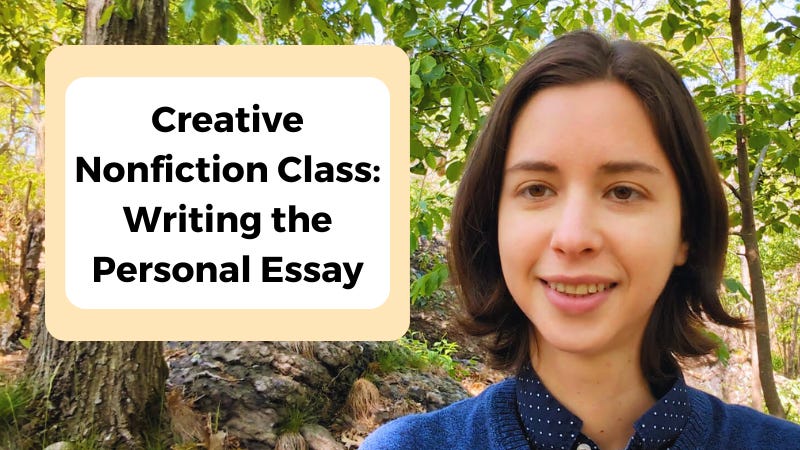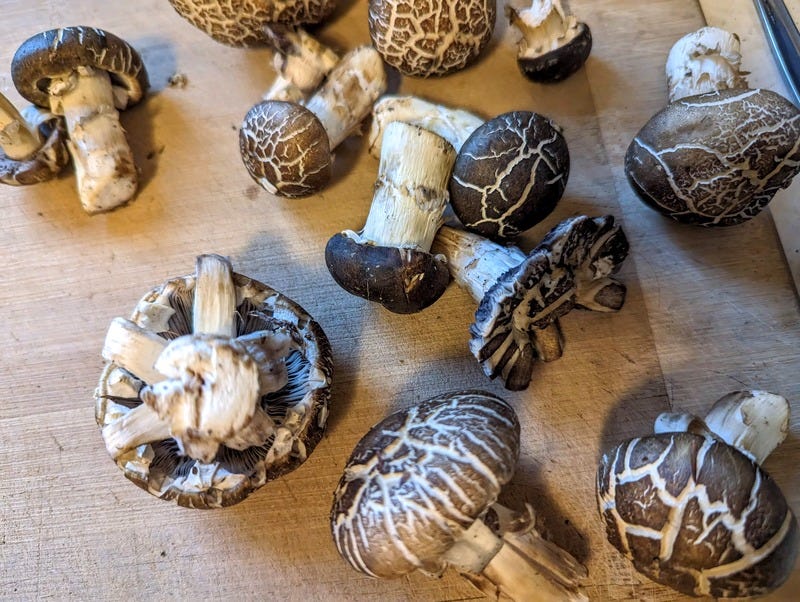Hi friends,
Before we get into this week’s topic, I’m so excited to announce I am teaching an online creative nonfiction class on writing the personal essay…and, some excellent people are starting to sign up!
Starting June 12th, this will be a four week, fun, supportive, inspirational, creative experience. With readings, videos, assignments with instructor feedback, and live office hour discussions, this class is not to be missed!
Please check out more details including the early bird discount until this Thursday, June 1, here:
I listened to Michelle Obama’s book, Becoming, a few years ago. She’s a great storyteller and presents her experience of being a lawyer, mother, and First Lady well. I particularly enjoyed listening to her story in her own resonant and cheerful voice—she narrates the audiobook.
There was a difference between the first two-thirds of the book and the last third. Michelle Obama’s stories from years ago, perfected on the presidential campaign trail, or simply worked over and over and over again, were crisper and more engaging. The later/more recent stories were at times confusing, representing the reality of our lives that don’t always “make sense” at the time we are living them.
Both of these things are true: We live confusing, muddled, jumbled lives, and over time we pull out aspects of our memories to create narratives for ourselves.
The types of narratives we create may be influenced by our cultural backgrounds. “The Hero’s Journey” archetype is only one (primarily Western) way to create a story. Other types of stories may resonate with you more.
By telling our own stories well, we show respect to ourselves and our lived experiences.
Most of us have an internal monologue that can speak about ourselves quite disrespectfully at times. “I’m no good at this. I always mess up. I shouldn’t have done that. Why can’t I do anything?” This is an example of bad storytelling, because it makes the audience (you) feel bad, and nothing happens to the main character. If you “always mess up,” there is no character development! no plot! no growth!
It’s time to boo the inner monologue off the stage.
Instead, consider something you’ve learned. Or worked on. Or changed about yourself. I’m sure you have something. Did you get more familiar with the place where you live? Did a book or movie change your life? Did you learn to cook a delicious new recipe?
You can make this into a story, three sentences long. First, what were you like before? Then, what changed? Finally, what are you like now?
“I really loved the vegetarian spicy noodle soup, bun bo hue chay, in San Francisco but was intimidated to made it myself. Then, I moved to a different city and started learning to recreate the soup I remembered. Now, I love cooking my own soup, inspired by but not authentic to Vietnamese cuisine.”
This is a pretty straightforward example. We’re not going to make a movie out of it! But as a narrative, it shows growth, change, and emotion.
In fiction, sometimes stories become personified, characters in their own right. Certain stories resonate strongly with many people, I think because they remind us of our own realness.
From The Velveteen Rabbit by Margery Williams Bianco:
“Real isn't how you are made,' said the Skin Horse. 'It's a thing that happens to you. When a child loves you for a long, long time, not just to play with, but REALLY loves you, then you become Real.'
'Does it hurt?' asked the Rabbit.
'Sometimes,' said the Skin Horse, for he was always truthful.
Tinkerbell from Peter Pan is another character who depends on storytelling to exist. She needs people to believe in her reality. And what we would do for others, we should do for ourselves also. It’s important to believe our own real stories.
Julia Tausch wrote, and I’ve been thinking about it all week, “it’s deeply satisfying and, like, healing to me to create a coherent narrative out of disparate, confusing things.”
It’s clear the narrative is not only for others. Creating the narrative of our own lives is for ourselves.
We have to believe we can grow, change, and learn. No matter how good we get, we are always learning.
I’m going to try hosting a discussion thread later this week to chat about everyone’s narrative ideas or anything this newsletter brought up for you. Expect an email or notification about that - and, if you don’t want discussion threads there will be an option to unsubscribe from those.
In my writing class starting June 12th, we will dig deep into creating narratives out of our own personal stories:
If you’ve enjoyed this issue of Amplify Respect, please, do me a favor - share this with a friend. If any part particularly resonated with you, copy a quote or take a screenshot and share it on Substack or other social media. I’d love to get the word out.
Thanks so much for reading my newsletter. It means a lot to me.
Take care,
Rey








So true